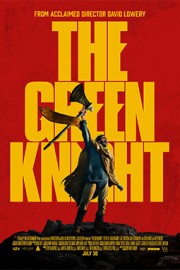The Green Knight
The story of Sir Gawain and the Green Knight is, I think, less familiar to the general population than King Arthur, even though it is still well known. In adapting the story to film, writer-director David Lowery appears to be drawn to tell a narrative of a young man whom accepts a challenge, but does not appear to understand the weight of responsibility that challenge comes with, and finds himself tested to meet it throughout his journey. In a way, it mirrors the challenge many of us have faced in the past year and a half of a global pandemic; not everyone has met it with the same degree of courage or nobility- if one did not know that the film’s release had, in fact, been delayed because of the pandemic, “The Green Knight” might be construed as allegorical.
As the film progressed, I found myself thinking quite a bit about Robert Zemeckis’s “Beowulf.” That movie- due, I think, to its divisive animation- has never gotten the credit it deserves for how it peels layers back on the idea of the Joseph Campbell archetypes of hero’s quests and simple notions of heroism and good vs. evil to explore the shades of grey in reality through classic literature. “The Green Knight” deals with similar ideas in its adaptation of Sir Gawain, but it is more baked into the original story than “Beowulf” was. In reading a summary of the story afterwards, I was struck with how Lowery deviated from the ending to highlight these ideas, and challenge the audience in whatever ideas we may have about Sir Gawain, and what he learned, by the closing credits. Then again, Lowery is nothing if not challenging to his audience- his “Pete’s Dragon” remake for Disney finds heartbreak the goofy original film only hinted at, and 2017’s “A Ghost Story” follows a ghost through time long after the life they knew has gone; neither follow easy narrative through lines towards their thematic goals, and such as it is with “The Green Knight.”
One of the changes to the narrative that helps Lowery get to his ideas is that Sir Gawain, played here by Dev Patel, is still King Arther’s nephew, but not quite a knight. This makes Gawain’s decision to accept the Green Knight’s Christmas “game” more weighty than the original poem; now, Gawain’s choice is part and parcel with his evolution towards potentially becoming a Knight of the Round Table, rather than already being one himself. The film, then, becomes a traditional hero’s journey, and the challenges Gawain faces in courage and conviction become more perilous, as they force him to confront his own sense of duty and responsibility. There is not much that is traditional about how Lowery frames Gawain’s journey, however; that’s why it captivates us, as much as it does.
The production of “The Green Knight” is both epic and scope, and intimate and how it frames the journey Gawain goes on. This is a magnificently-mounted story, with sets, costumes, makeup and special effects that give us a sense of awe, but do not overwhelm the story. There are shot compositions in the cinematography by Andrew Droz Palermo that capture our imaginations while also effortlessly getting to the emotional core of the moment. The music by Daniel Hart doesn’t play by conventional ideas of cinematic fantasy scoring, for the most part, and it is a mesmerizing piece of film scoring.
Lowery’s decision to cast Gawain’s mother, and the sorceress who seems to bring forth the Knight, as the same actress makes for an interesting choice that pays off. By seeing the mother and sorceress (Sarita Choudhury) as two sides of the same coin, one can see the sorceress as a representation of Gawain’s mother challenging her son to become a man, and face his destiny. The other key women in the film, Essel and “The Lady,” are also played by the same actress (in this case, Alicia Vikander). Essel is a woman at the castle that Gawain has longed for, and whom has a crucial sequence late in the film; “The Lady” is the wife of a hunter (Joel Edgerton). Gawain comes across their home on his journey, and he stays for a few days. As the hunter goes off during the day, his wife tries to seduce Gawain, leading to a gifting of a green girdle, and a decision he immediately regrets. The girdle will protect him on his way, but the weight of such a gift comes with a realization when he gets to the green chapel to pay his debt to the Green Knight. There’s another woman he meets along the way, Winifred (Erin Kellyman), whom is missing something dear to her; at the end of this scene, Gawain has a fox to accompany him on his quest, seemingly, the most important gift he receives along his quest.
Lowery’s approach to this story is superb from a technical standpoint, as well as a narrative one, although moments in the early part of the quest felt meandering. When the lush production values and strong performances he gets from his actors (which also includes Sean Harris as King Arthur and Kate Dickie as the Queeen) are in sync, this is one of the most striking pieces of filmmaking in recent years. Patel is a marvel as Gawain, an actor with the youth to be plausible as someone inexperienced enough to partake in the Knight’s “game,” but someone who projects weight in their choices along this journey. Meandering aside, this is a remarkable cinematic accomplishment. I cannot wait to experience it again.










